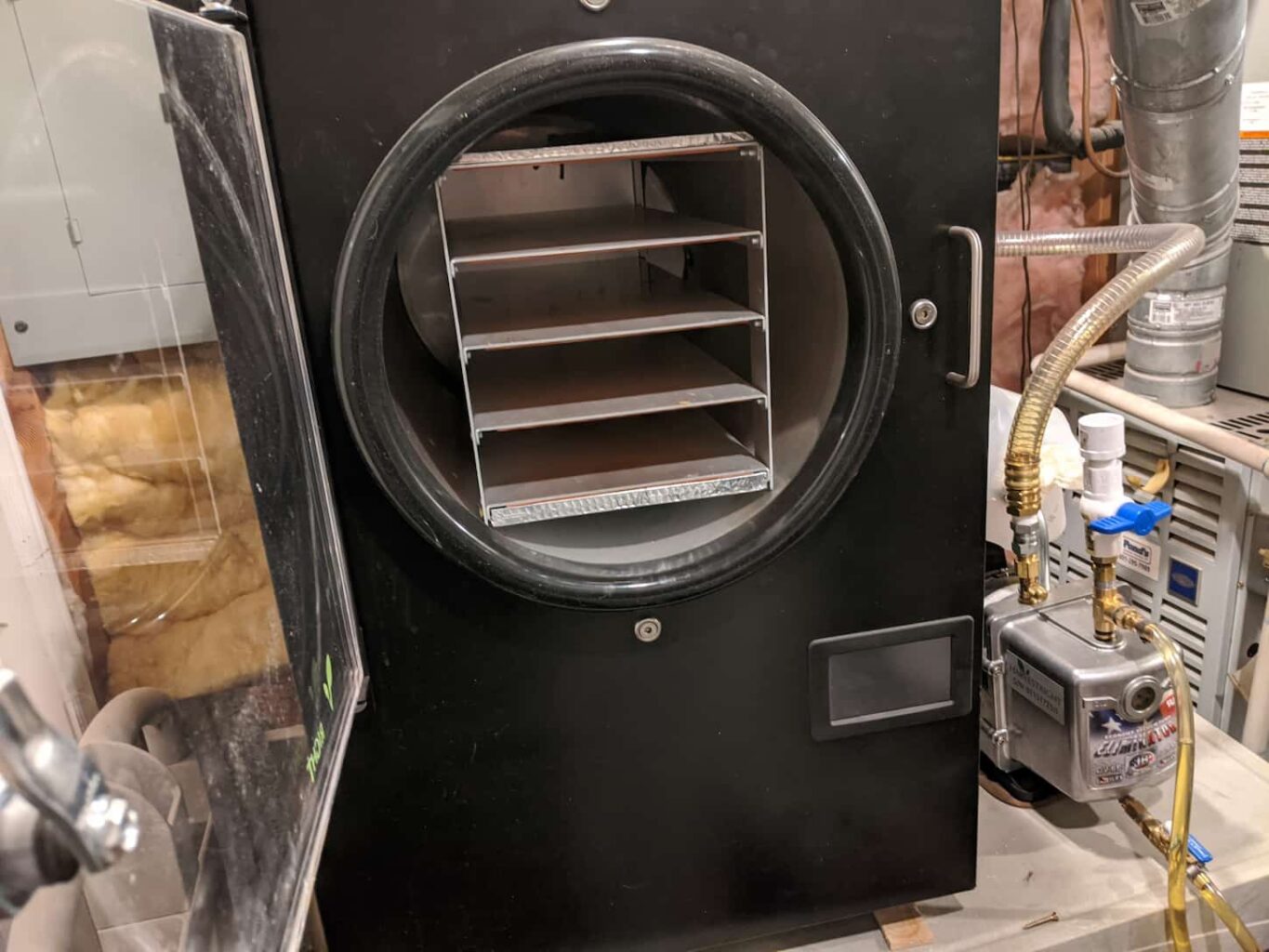One of the biggest concerns that people seem to have when thinking about getting a freeze dryer is based on whether it is noisy. Of course, freeze dryers are pretty complex machinery so do make some noise, but it’s a little difficult to understand whether this is likely to be a problem for you before you have one.
Home freeze dryers operate at around 65 dB (decibels) – somewhere in between normal conversation (which is around 60 dB) and the noise made by a vacuum cleaner (70 dB). The noise can get old as a freeze dryer runs for 24+ hours, which is why we keep ours in a utility room behind closed doors.
Although 10 decibels of difference doesn’t seem like a lot, the decibel scale is actually logarithmic, which means that 70 dB is considered ten times the volume of 60 dB. Keeping that extra 10 decibels behind closed doors really does make a big difference, though!
Confused by the numbers? Don’t worry, it’s a common thing, but read on to understand more about how loud this really is, and how you can avoid it!

Are Freeze Dryers Noisy?
In my own experience, the freeze dryer itself isn’t super loud, but the vacuum pump can be a little noisy. It’s comparable to the noise of a washing machine. It’s not so loud that you can’t block it out or will find it super annoying, but it’s loud enough that you might want to think carefully about where to keep it.
It’s worth bearing in mind that newer freeze dryers are quieter than older models, and various models of vacuum pumps also operate at slightly different volumes. Different models also make slightly different sounds which might annoy you more or less!
Bearing in mind the low cost of the pump relative to that of the dryer as a whole, it can be a good idea to buy a more efficient pump. This is especially true if you’re likely to use your freeze dryer a lot and if volume will be a key issue for you. It’s also a worthwhile investment because the pump is the most likely part of the freeze dryer to break, and there’s no harm in having a spare just in case – if you can afford it.
Even when you just use the same freeze dryer, it doesn’t always make the same noises, and there are also a few things to consider when you choose where to keep it! But more about these things later.
What’s the Normal Noise Level of a Freeze Dryer?
Freeze dryers essentially have two phases of operation, a freezing phase and then a vacuum phase.
- During the freezing process, the noise level of a freeze dryer is pretty minimal, the same as a normal freezer. There’s just a quiet kitchen-y hum.
- During the vacuum part (the longest part of the process), the vacuum pump engages, which is significantly louder. This level of noise is comparable to that of a washing machine or dishwasher.
Bear in mind that freeze dryers tend to operate for much longer than washing machines or dishwashers, so you may want to consider how to reduce the volume by moving your dryer.
Important note: if you’ve got a quiet dishwasher, then it’s not going to be a good measure of how loud a freeze-dryer is. We’ve got a Bosch dishwasher that’s nearly silent, even when you’re standing right next to it. Our freeze-dryer is more like standing in our laundry room when we’ve got both the washing machine and dryer going.
In that case, it’s not impossible to have a conversation (in either the laundry room or next to the freeze-dryer). But we definitely like having those appliances in rooms where we can close the door – so that then we can have our conversation.
Want to hear a freeze-dryer in action? Here’s how it sounds on a YouTube video right up next to it. It starts at about the 1:25 mark, which I queued for you via that link.
Where Should You Keep a Freeze Dryer so it’s Not too Loud?
To avoid the noise of a freeze dryer, many people keep theirs in spare rooms such as a laundry room, a storage room, or a spare bedroom. We keep ours in a storage room with a door.
Harvest Right, the manufacturer of my freeze dryer, suggests that in particular, a laundry room might be suitable to store your freeze dryer, as these rooms are features of modern houses designed to mitigate the noise of laundry appliances. The noise a freeze dryer makes is similar to that of laundry appliances, so it makes sense to also keep it in a similar place.
Our laundry room barely holds the washing machine and dryer, so we can’t use that. Instead, we keep it in a storage/utility room that’s in our basement. Just check out all the fun stuff in the background of our storage room – including the visible insulation!

It shouldn’t be too complex to choose a good place to store your freeze dryer. In general, you should have just three main concerns; the temperature of the place, the possibility of the pump making a mess, and the dryer having somewhere offering drainage.
The dryer should be stored somewhere with a consistently temperate climate, and somewhere you don’t mind putting a bucket down to collect water from the drainage valve. Most pumps operate with oil, so it’s also a good idea to keep it somewhere that the occasional spilled drop of oil won’t matter!
Can You Keep a Freeze Dryer in the Garage?
Most people shouldn’t keep a freeze dryer in the garage, as it should be shielded from extreme temperatures. It may be suitable if you live in a climate with a consistently moderate temperature or if you have a climate-controlled garage.
Freeze dryers are pretty temperature sensitive. Although it’s not dangerous to keep them in different temperatures, hotter temperatures in particular will drastically increase the energy consumption of the appliance, as well as the amount of time it takes it to process a batch. The best practice is to keep your freeze dryer somewhere indoors where you can regulate the temperature.
In most circumstances, rather than keeping your dryer in the garage, it’s better to store it in a temperate place such as a spare room or utility room. Make sure to keep your freeze dryer away from other common household appliances that produce a lot of heat, such as tumble dryers.
What Does it Mean When the Usual Freeze Dryer Noises Change?
Other than the usual difference between the quiet hum of the freezer and louder pump noise (as well as the beep that lets you know the process is finished), changes to the noises of the freeze dryer can be indications that something is wrong with your appliance.
In general, if you suspect that your freeze dryer isn’t working properly you should inspect the sealed parts, as the most likely fault is in the vacuum seal. However, if after a sudden change you check this and find no issues, there’s no harm in consulting the Harvest Right support helpline at 1-800-700-5508.
Final Thoughts on Freeze Dryer Noise
Freeze-dryers really aren’t super-crazy loud. They also aren’t silent. But as long as you’ve got some spare room to put them in that has a door you can close? You’ll likely forget it’s there, so don’t forget to set an alarm when it’s time to check whatever food you just freeze-dried!
Yes, I totally have to do that. The freeze dryer’s polite beep is on-par with the regular noise, which I can’t hear behind a closed door or over the usual daytime sounds in our home.
Now that you know exactly how loud freeze dryers are, make sure you check out this article I wrote about how much freeze dryers cost – including 28 factors and hidden costs you may not have considered. That way, you’ll know exactly what you’re in for when you invest in a Harvest Right freeze dryer (which I highly recommend, by the way!).
Resources
Learning from your own experience is essential, but learning from others is also intelligent. These are the sources used in this article and our research to be more informed as homesteaders.
- Hoaks, Donna. “THE SOUND OF SECURITY.” Harvest Right, 15 Nov. 2019, harvestright.com/blog/2019/the-sound-of-security.
- “Maintenance of a Freeze Dryer: Most Commonly Asked Questions.” Harvest Right Freeze Dryer Manual. https://harvestright.com/wp-content/uploads/2020/08/Owners-Manual-072020-DIGITAL.pdf
